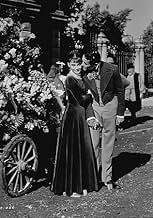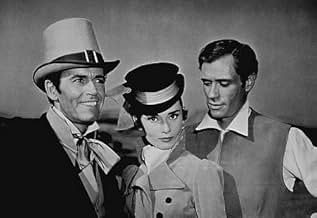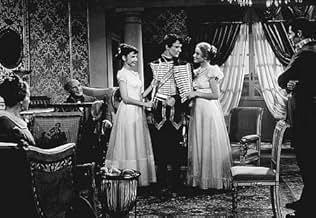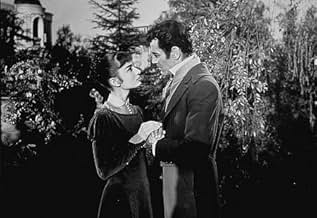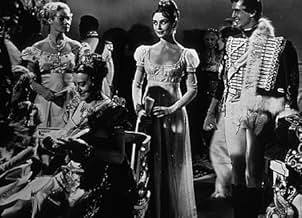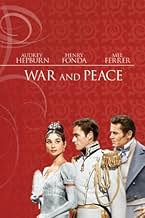La relación agitada de Napoleón con Rusia, incluida su desastrosa invasión de 1812, sirven como escenario para las complicadas vivencias personales de dos familias aristocráticas.La relación agitada de Napoleón con Rusia, incluida su desastrosa invasión de 1812, sirven como escenario para las complicadas vivencias personales de dos familias aristocráticas.La relación agitada de Napoleón con Rusia, incluida su desastrosa invasión de 1812, sirven como escenario para las complicadas vivencias personales de dos familias aristocráticas.
- Dirección
- Guionistas
- Elenco
- Nominado a 3 premios Óscar
- 6 premios ganados y 13 nominaciones en total
- Prince Bolkonsky
- (as Wilfred Lawson)
Opiniones destacadas
Mel Ferrer is nowhere near the same league as Omar Sharif was in "Zhivago". Sharif was great, Ferrer just average. Ferrer is a major drawback. In contrast, Fonda displays tremendous acting ability (not having read the book I can concentrate on his performance rather than whether he looks the part). Hepburn is perfection and she delivers a great acting performance.
Yes it is a 1950's style movie, which of course has some dated aspects. However, in the case of costume, cinematography and some of the acting you couldn't see better in a film of any era. This is an impressive effort all-around.
Anyway, War and Peace is a most worthwhile film experience for Vidor and Cardiff's Technicolor Vistavision visuals, for the screenplay which is often quite beautifully written, and for many fine performances from some exceedingly charismatic film actors, especially the astonishing Audrey Hepburn. There are close-ups of her that will make your heart stop.
Thus, it must inevitably slight: a) many of the characters who bring joy to reading the novel - the princely father of the Kuragins, Sonja's story, Nicholas falling in love with Marya, the forgiveness by Bolkonsky (Ferrer) of Anatole Kuragin when his leg is amputated on a table beside which he is lain out, etc. and b) much of the philosophy contained in the book - whether about the masons or the purpose of life.
However, as a sort of highlights version of the novel, I thought it dealt well with the main lines of the plot.
It also is clearly 1950s film-making. There is little sense indoors of the lighting of the time, the sets look generally clean or deliberately destroyed (rather than mysterious and gloomy). In fact, the entire film appears all too clearly delineated - there is little of the kind of murkiness one would find in such a movie being made today - say, the way Schindler's List looks - or The Last Emperor looks.
The movie is also benefitted by having Audrey Hepburn, Anita Ekberg and John Mills - physically they are EXACTLY what I imagined of these characters - and I thought Mills and Hepburn were excellent. (And what Ekberg lacked in ability to convey emotion, she gained from her jaw-dropping embodiment of the buxom blonde!). The Henry Fonda choice for Bezuhov is an odd one - he's not the first person I think of when I think of a huge heavy awkward bear of a man. He did the best he could but was clearly miscast. Prince Bolkonsky (the father) and the Count and Countess Rostov were first rate - so were the choices for Napoleon, Homolka as Kutuzov, Kuragin, Dolokhov and the Rostov family. Mel Ferrer was ok - but imagine, say, the Terence Stamp of Far From the Madding Crowd and how he could have done.
All in all, this is clearly a movie of its time in cinematography, sets, the clearly drawn lines of the script - but it is entertaining and does about as well as possible in dramatizing in 3 1/2 hours a book of over 1000 pages.
The movie does suffer from two undeniable shortcomings. First is the atrocious sound recording that has blighted virtually every Italian movie ever made. As some of the comments have noted, movies shot at Rome's Cinecitta had their sound post-dubbed rather than recorded on the set. But actually, this practice was then (and remains) very common. The sound in Italian movies stands out simply because they were so bad at it. The brutal truth is, even the greatest masterpieces of Fellini, De Sica, Rosselini, etc. are less than they might have been because Italian sound technology was so slipshod. And so it is with WAR AND PEACE: it's hard to suspend disbelief when soldiers struggling across a river sound like someone dropping quarters into a toilet.
The other shortcoming is the appalling miscasting of Henry Fonda as Pierre Bezhukov. It's the worst performance of his career, and he looks and sounds about as Russian as a slice of pumpkin pie. One commenter here said Alec Guinness should have played Pierre. It's an intriguing suggestion, and of course Sir Alec was always good. Even better, I think, would have been Peter Ustinov. In 1956 he was Pierre to the very life.
But the rest of the casting is genuinely inspired. Oskar Homolka as Gen. Kutuzov, Barry Jones as Count Rostov, Jeremy Brett as Nikolai, Herbert Lom as Napoleon -- all could hardly be improved upon. And Audrey Hepburn was simply born to play Natasha. And Mel Ferrer as Prince Andrei ... well, he did have his faults as an actor (to say the least!), but at least he looked the part.
Beyond that, the movie has lavish production values, impressive battle scenes, and one truly great and powerful sequence, the French Army's disastrous retreat from Russia, that takes up much of the last hour.
There's no substitute, of course, for reading the novel (I've read it three times myself). But this 1956 movie makes a worthy introduction, and even helps to keep Tolstoy's complex plot straight when you do get around to reading it.
¿Sabías que…?
- TriviaAudrey Hepburn's character was supposed to be thirteen when the movie begins. She was twenty-seven when this movie came out.
- ErroresThe marching band in the opening parade are all playing modern musical instruments.
- Citas
Prince Andrei Bolkonsky: There must be something you want to do.
Pierre Bezukhov: I want to discover... everything! I want to discover why I know what's right and still do what's wrong. I want to discover what happiness is, and what value there is in suffering. I want to discover why men go to war, and what they really say deep in their hearts when they pray. I want to discover what men and women feel when they say they love.
- Créditos curiososClosing credits epilogue: The most difficult thing - but an essential one - is to love Life, to love it even while one suffers, because Life is all. Life is God, and to love Life means to love God. Tolstoy "WAR and PEACE"
- Versiones alternativasTwo different versions of the main titles exists. Both of them in English. In the one, the credits are set against a neutral background, in the other against details of a painting of Napoleon in front of his troops.
- ConexionesEdited into La magnífica aventura de Bill y Ted (1989)
Selecciones populares
- How long is War and Peace?Con tecnología de Alexa
Detalles
- Fecha de lanzamiento
- Países de origen
- Sitio oficial
- Idiomas
- También se conoce como
- War and Peace
- Locaciones de filmación
- Productora
- Ver más créditos de la compañía en IMDbPro
Taquilla
- Presupuesto
- USD 6,000,000 (estimado)
- Total a nivel mundial
- USD 24,874
- Tiempo de ejecución
- 3h 28min(208 min)


